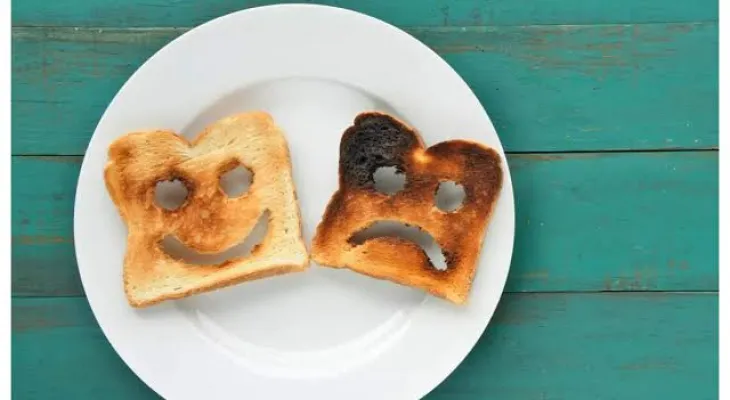
Burnt Food: A Hidden Health Risk
When food is charred or overcooked, it undergoes a chemical transformation that releases harmful toxins. These can have significant consequences for your health.
Some of the primary concerns include:
- Cancer Risk: Burnt food contains carcinogenic compounds such as Polycyclic Aromatic Hydrocarbons (PAHs), Heterocyclic Amines (HCAs), and Acrylamide, all of which have been linked to an increased risk of cancers like colorectal, breast, and prostate cancer.
- Neurological Damage:Neurotoxins like Advanced Glycation End-products (AGEs) and lipid peroxides, which form when food is burnt, can damage brain cells, potentially leading to memory loss, cognitive decline, and neurodegenerative diseases such as Alzheimer's and Parkinson's.
- Digestive Issues:Burnt food can irritate the digestive system, leading to problems like heartburn, bloating, diarrhea, and abdominal pain.
- Cardiovascular Disease: Regularly consuming burnt food can raise blood pressure, increase cholesterol levels, and damage blood vessels, elevating the risk of heart disease.
- Weakened Immune System:Burnt food contains compounds that can suppress the immune system, making you more susceptible to infections.
- Respiratory Problems: The smoke from burnt food can cause respiratory irritation and contribute to conditions such as asthma and Chronic Obstructive Pulmonary Disease (COPD).
Prevention Tips:
- Cook at Lower Temperatures:Avoid burning food by cooking at lower temperatures.
- Choose Healthier Methods:Opt for cooking techniques like steaming or roasting instead of grilling or frying.
- Limit Reheating:Avoid reheating food multiple times to prevent the formation of harmful compounds.
- Use Healthy Oils:Select oils with high smoke points to reduce the production of harmful substances when cooking.
Recognizing Burnt Food:
- Burnt food often has a blackened or charred appearance, an unpleasant odor, and a bitter taste.
While an occasional burnt meal may not cause significant harm, regularly consuming burnt food can have serious health implications. By adjusting your cooking habits and being mindful of food quality, you can reduce these risks and protect your long-term health.

















